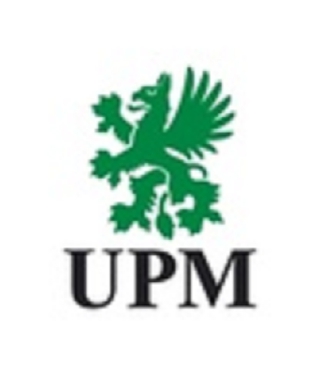UPM-KYMMENE OTEPÄÄ OÜ current status
This company's branding has already reached 12,480 peopleand his is followed by 78 Storybook users.On average, the company has been rated 5.0 points.but there is no comment.
's activity report 2022
Company Introduction
UPM-Kymmene Otepää OÜ is a 100% subsidiary of UPM Plywood Oy. The 100% owner of UPM Plywood Oy is in turn the UPM-Kymmene Group. The company is one of the largest employers in Valga County and the largest processor of birch wood in Estonia.
The company's production capacity is 90,000 m3 of birch plywood per year. Both wood-faced and post-processed birch plywood are produced.
Added value is created for post-processed products with surface materials or sound insulation, using a special rubber between the layers of plywood.
The birch veneer required for the production of plywood is produced on site. Birch chips generated during the production process can be used as raw material for the pulp or board industry, for the production of wood pellets, for the production of heat energy in the factory or in nearby boiler houses. In addition to chips, birch bark and sanding dust are sold as by-products. The heat energy required for production is produced on site from wood-based fuels generated during production.
The marketing of products from the Otepää plywood factory is handled by UPM Plywood Oy sales representatives.
Operating Environment and Financial Risks
The impacts of the external environment are related to strong international competition, which seriously affects local raw materials and their availability.
Forestry and the wood industry more broadly are green economy and have great advantages over activities consuming fossil materials and fossil fuels. For a better environment, it is wise to manage forests efficiently and sustainably, which ensures the sustainability of the sector. The Estonian wood industry is focused on export and adding value to local renewable raw materials.
The COVID-19 pandemic and the measures taken to prevent its spread led to a sharp decline in the global economy in 2020. In 2021.
The global economy began to recover, but it is uncertain how long the recovery will last. Progress has been made with vaccination, but new outbreaks of the epidemic in different parts of the world are still possible. The recovery of the global economy from the large decline in 2020 and the ongoing pandemic at the same time have strained and disrupted many supply chains, including logistics and energy, which has increased costs and price uncertainty and affected the availability of many raw materials and energy. China has implemented
a COVID-19 zero strategy, which slowed China's economic growth until 2022. UPM has implemented extensive precautions during the pandemic. So far, the company has been able to protect its employees well and keep the company operational.
Due to the COVID-19 pandemic, there were more absences from work at the plywood factory, especially in the first half of the year.
In response to Russia's invasion of Ukraine, the European Union and several countries imposed extensive sanctions, particularly against Russia and
Belarus. The EU has imposed export and import bans on several forestry product categories, banned Russian transport companies from entering the EU, and imposed sanctions on several Russian banks. Disruptions in international buying and selling activities and payment flows related to Russian partners are inevitable. Russia has also adopted a law restricting non-Russian companies from repatriating dividends and loan payments, which has caused disruptions in collecting customer payments from Russia. Russia has also restricted or stopped the supply of natural gas and electricity from Russia. These restrictions have affected several European countries where UPM operates production, and have led to an increase in electricity and gas prices. The full impact of current and possible new sanctions, counter-sanctions and market trends can only be known as the situation evolves. UPM is closely monitoring the situation and making decisions accordingly.
There was high demand for birch plywood in the production of sheet materials and vehicle floors and in construction-related industrial applications.
Market prices rose in many end-use areas.
Credit risk is the risk that the company will suffer a loss if the counterparty fails to meet its contractual financial obligations. The company manages credit risk through the central credit process managed by UPM's
Customer Operations in Finance department. The credit process includes customer assessment and continuous monitoring, collection, follow-up of overdue invoices and credit insurance protection. Currency risk does not significantly affect the company, as all major transactions made during the year, including sales contracts, are in euros. There is no significant interest rate risk as the company does not have long-term loans. The impact of other financial risks such as liquidity risk is less significant to the company and is managed by UPM's Treasury department.
Development Activities and Management Systems
The company focuses on finding ways to prevent accidents, improving product quality and increasing efficiency, as well as identifying and preventing hazardous situations. Regular tours on work safety and environmental protection identify risks and make observations on necessary actions.
The company's production activities allow the use of the CE conformity marking on products.
The company's operations comply with the environmental management system ISO 14001:2015 and the quality management system ISO 9001:2015. The FSC and PEFC supply chain scheme is followed in proving the origin of wood raw material.




Comments (0)